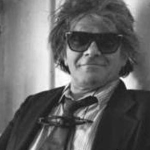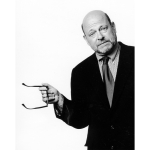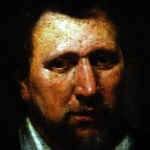Walking back to the office after lunch,
I saw Hans. “Mister Isham, Mister Isham,”
He called out in his hurry, “Herr Wegner needs you.
A woman waiting for a border pass
Took poison, she is dead, and the police
Are there to take the body.” In the hall,
The secretaries stood outside their doors
Silently waiting with Wegner. “Sir,” he said,
“It was her answer on the questionnaire,
A clerk for the Gestapo. So it was.”
Within the outer office, by the row
Of wooden chairs, one lying on its side,
On the discolored brown linoleum floor
Under a GI blanket was the lost
Unmoving shape; uncovered, from a fold,
A dirty foot half out of a dirty shoe,
Once white, heel bent, the sole worn through, the skin
Bruised red and calloused, uncut toenails curved
And veined like an old ivory. No one spoke.
Police stood at attention by a stretcher.
After an empty moment, suddenly
Bent over as if taken by a cramp,
I sobbed out loud and, on my uniform,
Vomited up my lunch—over the tie,
The polished buttons and insignia,
The little strips of color and the green
Eisenhower jacket with its Eagle patch,
The taut pants in a crease, the glistening jump-boots—
Vomiting and still sobbing, like a child
Held me, murmuring, “Ach, dear sir, the war
Is over and not over, such things happen.”
While no one else moved, Frau Schmidt brought a towel
To clean me off before Hans walked me back,
My arm across his shoulders and I retelling
The story of how, near Zell am See, we found,
Hung from a tree in leaf, the final sack
Of bones, in rotted Wehrmacht green. In the house
An SS lord had furnished for his mistress—
Deep sofas, Persian rugs, and velvet drapes—
Frau König took my clothes. In my own room,
Wearing the Gucci robe Bouchard had taken
From a fine house before we got to Ulm,
Instead of lying down to rest, I studied
The book I read for German with Frau Schmidt,
Goethe’s Italian Journey. Through the window,
The Watchman’s upper slopes were shadows, green
And purple with the afternoon, its snows
Melting, its double peaks the victory sign.





















Comment form: